The Role of Nursing in Addressing Cognitive Development Issues
VerifiedAdded on 2022/09/10
|9
|2255
|17
Report
AI Summary
This report delves into the critical developmental stage of early childhood, focusing on cognitive development as a key domain influencing future behaviors and attributes. It discusses cognitive development, its various stages as proposed by Piaget, and the impact of delays in areas like math skills. The report identifies symptoms of delayed cognitive development, such as difficulties in problem-solving and critical thinking, and analyzes their long-term effects, including behavioral and communication problems. Furthermore, it emphasizes the vital role of child and family health nurses in detecting, assessing, and providing care for children with cognitive development delays. The nursing responsibilities include surveillance, parent-child interaction assessment, policy influence, parental education, and interventions like games and exercises. The report also outlines potential requirements for referrals to other health professionals and strategies for families to support cognitive development, such as continuous assessment and advocating for high-quality early childhood development. The report concludes by highlighting the importance of early intervention and the role of nursing practitioners in improving the cognitive health of children and families.

Running head: Healthcare
CHILD AND FAMILY HEALTH
By (Student's Name)
Class
Teacher
Name of the School
City
Date
CHILD AND FAMILY HEALTH
By (Student's Name)
Class
Teacher
Name of the School
City
Date
Paraphrase This Document
Need a fresh take? Get an instant paraphrase of this document with our AI Paraphraser
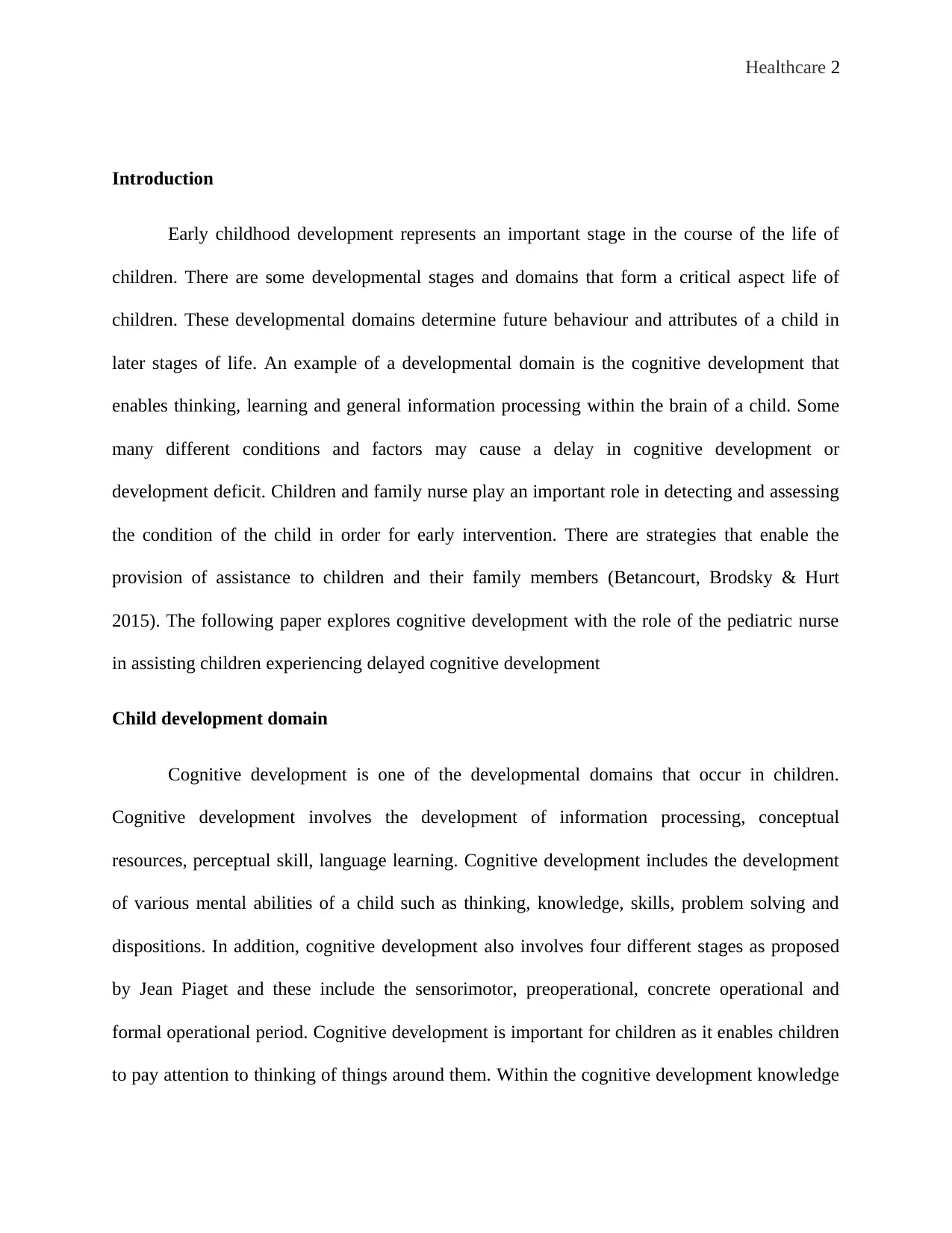
Healthcare 2
Introduction
Early childhood development represents an important stage in the course of the life of
children. There are some developmental stages and domains that form a critical aspect life of
children. These developmental domains determine future behaviour and attributes of a child in
later stages of life. An example of a developmental domain is the cognitive development that
enables thinking, learning and general information processing within the brain of a child. Some
many different conditions and factors may cause a delay in cognitive development or
development deficit. Children and family nurse play an important role in detecting and assessing
the condition of the child in order for early intervention. There are strategies that enable the
provision of assistance to children and their family members (Betancourt, Brodsky & Hurt
2015). The following paper explores cognitive development with the role of the pediatric nurse
in assisting children experiencing delayed cognitive development
Child development domain
Cognitive development is one of the developmental domains that occur in children.
Cognitive development involves the development of information processing, conceptual
resources, perceptual skill, language learning. Cognitive development includes the development
of various mental abilities of a child such as thinking, knowledge, skills, problem solving and
dispositions. In addition, cognitive development also involves four different stages as proposed
by Jean Piaget and these include the sensorimotor, preoperational, concrete operational and
formal operational period. Cognitive development is important for children as it enables children
to pay attention to thinking of things around them. Within the cognitive development knowledge
Introduction
Early childhood development represents an important stage in the course of the life of
children. There are some developmental stages and domains that form a critical aspect life of
children. These developmental domains determine future behaviour and attributes of a child in
later stages of life. An example of a developmental domain is the cognitive development that
enables thinking, learning and general information processing within the brain of a child. Some
many different conditions and factors may cause a delay in cognitive development or
development deficit. Children and family nurse play an important role in detecting and assessing
the condition of the child in order for early intervention. There are strategies that enable the
provision of assistance to children and their family members (Betancourt, Brodsky & Hurt
2015). The following paper explores cognitive development with the role of the pediatric nurse
in assisting children experiencing delayed cognitive development
Child development domain
Cognitive development is one of the developmental domains that occur in children.
Cognitive development involves the development of information processing, conceptual
resources, perceptual skill, language learning. Cognitive development includes the development
of various mental abilities of a child such as thinking, knowledge, skills, problem solving and
dispositions. In addition, cognitive development also involves four different stages as proposed
by Jean Piaget and these include the sensorimotor, preoperational, concrete operational and
formal operational period. Cognitive development is important for children as it enables children
to pay attention to thinking of things around them. Within the cognitive development knowledge
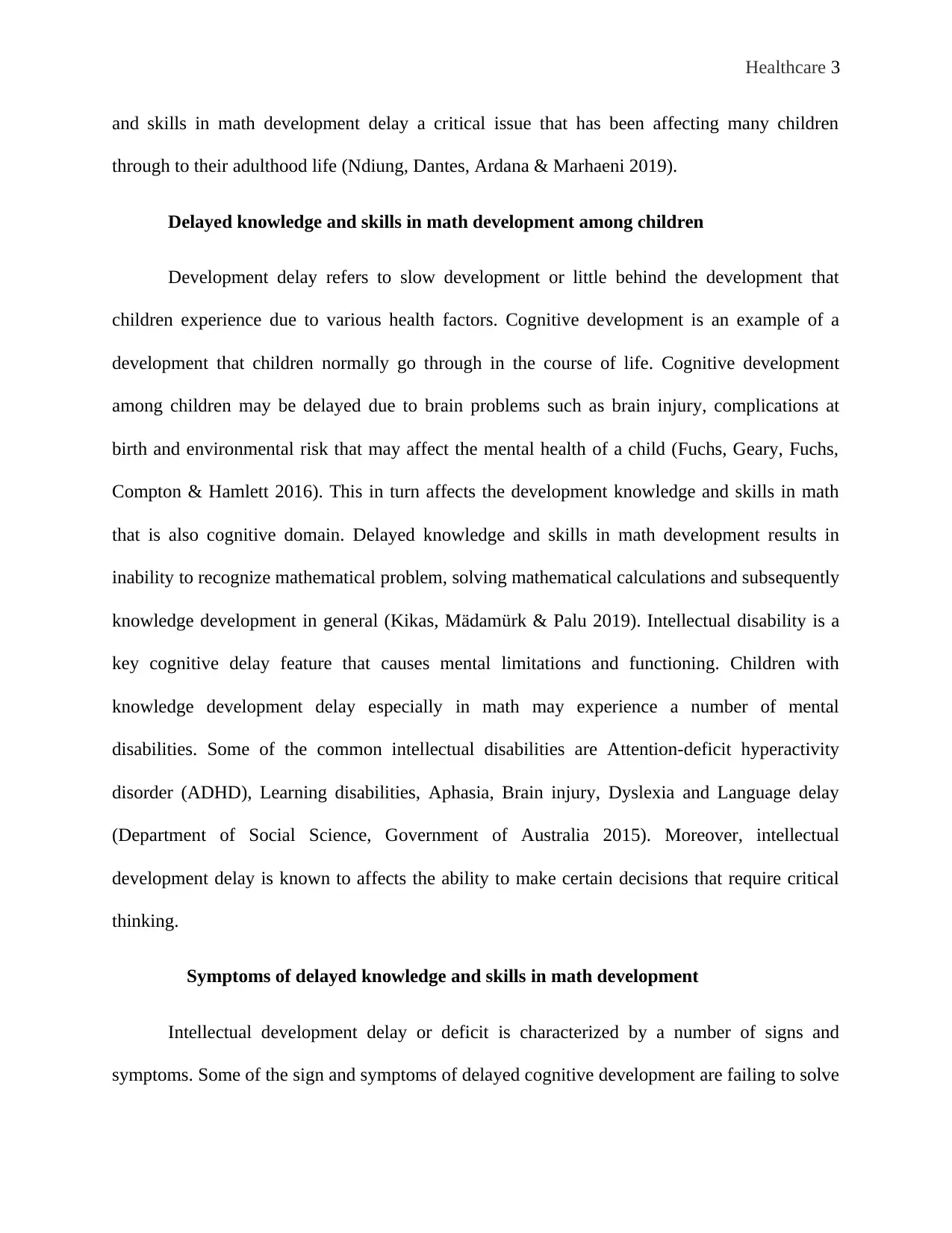
Healthcare 3
and skills in math development delay a critical issue that has been affecting many children
through to their adulthood life (Ndiung, Dantes, Ardana & Marhaeni 2019).
Delayed knowledge and skills in math development among children
Development delay refers to slow development or little behind the development that
children experience due to various health factors. Cognitive development is an example of a
development that children normally go through in the course of life. Cognitive development
among children may be delayed due to brain problems such as brain injury, complications at
birth and environmental risk that may affect the mental health of a child (Fuchs, Geary, Fuchs,
Compton & Hamlett 2016). This in turn affects the development knowledge and skills in math
that is also cognitive domain. Delayed knowledge and skills in math development results in
inability to recognize mathematical problem, solving mathematical calculations and subsequently
knowledge development in general (Kikas, Mädamürk & Palu 2019). Intellectual disability is a
key cognitive delay feature that causes mental limitations and functioning. Children with
knowledge development delay especially in math may experience a number of mental
disabilities. Some of the common intellectual disabilities are Attention-deficit hyperactivity
disorder (ADHD), Learning disabilities, Aphasia, Brain injury, Dyslexia and Language delay
(Department of Social Science, Government of Australia 2015). Moreover, intellectual
development delay is known to affects the ability to make certain decisions that require critical
thinking.
Symptoms of delayed knowledge and skills in math development
Intellectual development delay or deficit is characterized by a number of signs and
symptoms. Some of the sign and symptoms of delayed cognitive development are failing to solve
and skills in math development delay a critical issue that has been affecting many children
through to their adulthood life (Ndiung, Dantes, Ardana & Marhaeni 2019).
Delayed knowledge and skills in math development among children
Development delay refers to slow development or little behind the development that
children experience due to various health factors. Cognitive development is an example of a
development that children normally go through in the course of life. Cognitive development
among children may be delayed due to brain problems such as brain injury, complications at
birth and environmental risk that may affect the mental health of a child (Fuchs, Geary, Fuchs,
Compton & Hamlett 2016). This in turn affects the development knowledge and skills in math
that is also cognitive domain. Delayed knowledge and skills in math development results in
inability to recognize mathematical problem, solving mathematical calculations and subsequently
knowledge development in general (Kikas, Mädamürk & Palu 2019). Intellectual disability is a
key cognitive delay feature that causes mental limitations and functioning. Children with
knowledge development delay especially in math may experience a number of mental
disabilities. Some of the common intellectual disabilities are Attention-deficit hyperactivity
disorder (ADHD), Learning disabilities, Aphasia, Brain injury, Dyslexia and Language delay
(Department of Social Science, Government of Australia 2015). Moreover, intellectual
development delay is known to affects the ability to make certain decisions that require critical
thinking.
Symptoms of delayed knowledge and skills in math development
Intellectual development delay or deficit is characterized by a number of signs and
symptoms. Some of the sign and symptoms of delayed cognitive development are failing to solve
⊘ This is a preview!⊘
Do you want full access?
Subscribe today to unlock all pages.

Trusted by 1+ million students worldwide
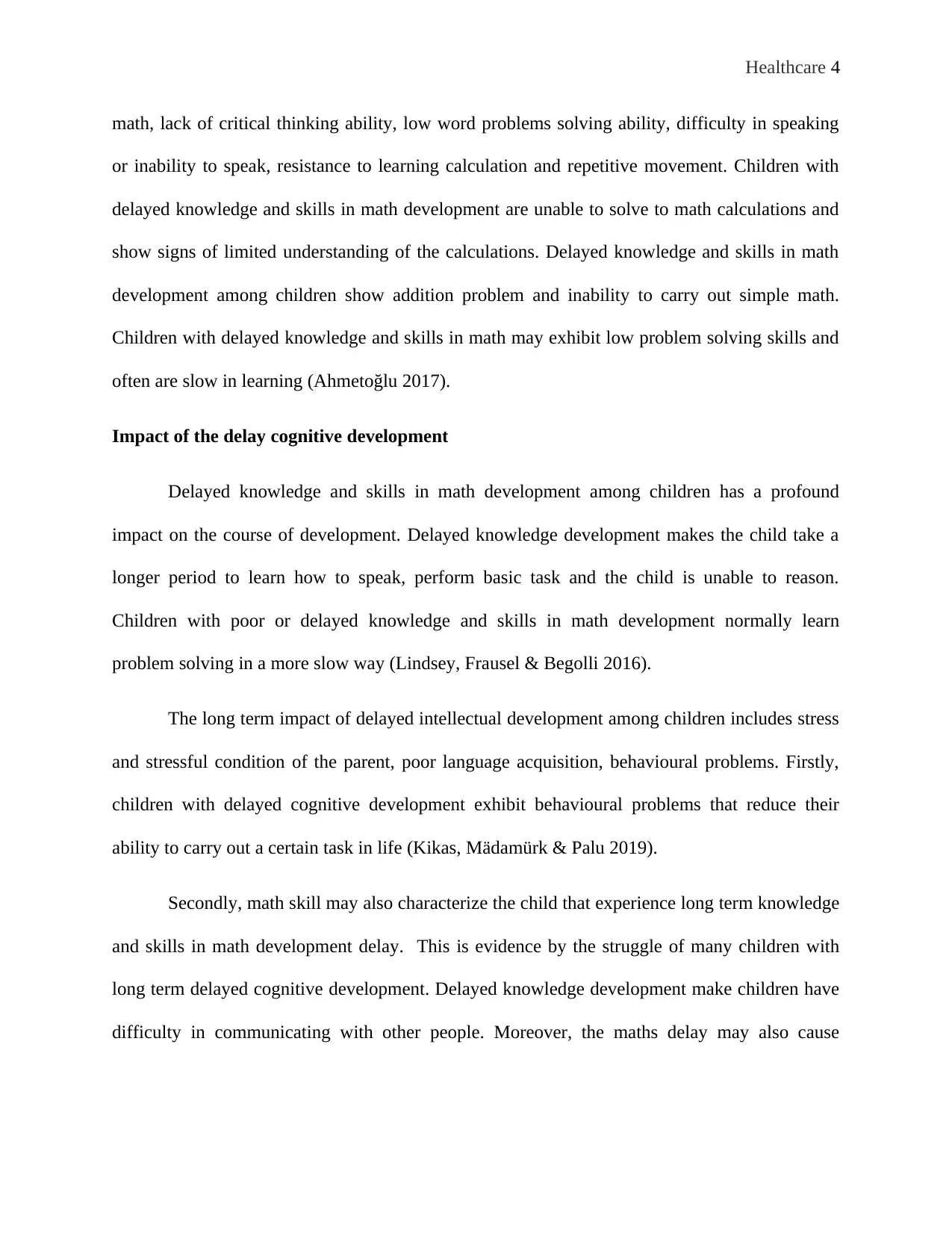
Healthcare 4
math, lack of critical thinking ability, low word problems solving ability, difficulty in speaking
or inability to speak, resistance to learning calculation and repetitive movement. Children with
delayed knowledge and skills in math development are unable to solve to math calculations and
show signs of limited understanding of the calculations. Delayed knowledge and skills in math
development among children show addition problem and inability to carry out simple math.
Children with delayed knowledge and skills in math may exhibit low problem solving skills and
often are slow in learning (Ahmetoğlu 2017).
Impact of the delay cognitive development
Delayed knowledge and skills in math development among children has a profound
impact on the course of development. Delayed knowledge development makes the child take a
longer period to learn how to speak, perform basic task and the child is unable to reason.
Children with poor or delayed knowledge and skills in math development normally learn
problem solving in a more slow way (Lindsey, Frausel & Begolli 2016).
The long term impact of delayed intellectual development among children includes stress
and stressful condition of the parent, poor language acquisition, behavioural problems. Firstly,
children with delayed cognitive development exhibit behavioural problems that reduce their
ability to carry out a certain task in life (Kikas, Mädamürk & Palu 2019).
Secondly, math skill may also characterize the child that experience long term knowledge
and skills in math development delay. This is evidence by the struggle of many children with
long term delayed cognitive development. Delayed knowledge development make children have
difficulty in communicating with other people. Moreover, the maths delay may also cause
math, lack of critical thinking ability, low word problems solving ability, difficulty in speaking
or inability to speak, resistance to learning calculation and repetitive movement. Children with
delayed knowledge and skills in math development are unable to solve to math calculations and
show signs of limited understanding of the calculations. Delayed knowledge and skills in math
development among children show addition problem and inability to carry out simple math.
Children with delayed knowledge and skills in math may exhibit low problem solving skills and
often are slow in learning (Ahmetoğlu 2017).
Impact of the delay cognitive development
Delayed knowledge and skills in math development among children has a profound
impact on the course of development. Delayed knowledge development makes the child take a
longer period to learn how to speak, perform basic task and the child is unable to reason.
Children with poor or delayed knowledge and skills in math development normally learn
problem solving in a more slow way (Lindsey, Frausel & Begolli 2016).
The long term impact of delayed intellectual development among children includes stress
and stressful condition of the parent, poor language acquisition, behavioural problems. Firstly,
children with delayed cognitive development exhibit behavioural problems that reduce their
ability to carry out a certain task in life (Kikas, Mädamürk & Palu 2019).
Secondly, math skill may also characterize the child that experience long term knowledge
and skills in math development delay. This is evidence by the struggle of many children with
long term delayed cognitive development. Delayed knowledge development make children have
difficulty in communicating with other people. Moreover, the maths delay may also cause
Paraphrase This Document
Need a fresh take? Get an instant paraphrase of this document with our AI Paraphraser
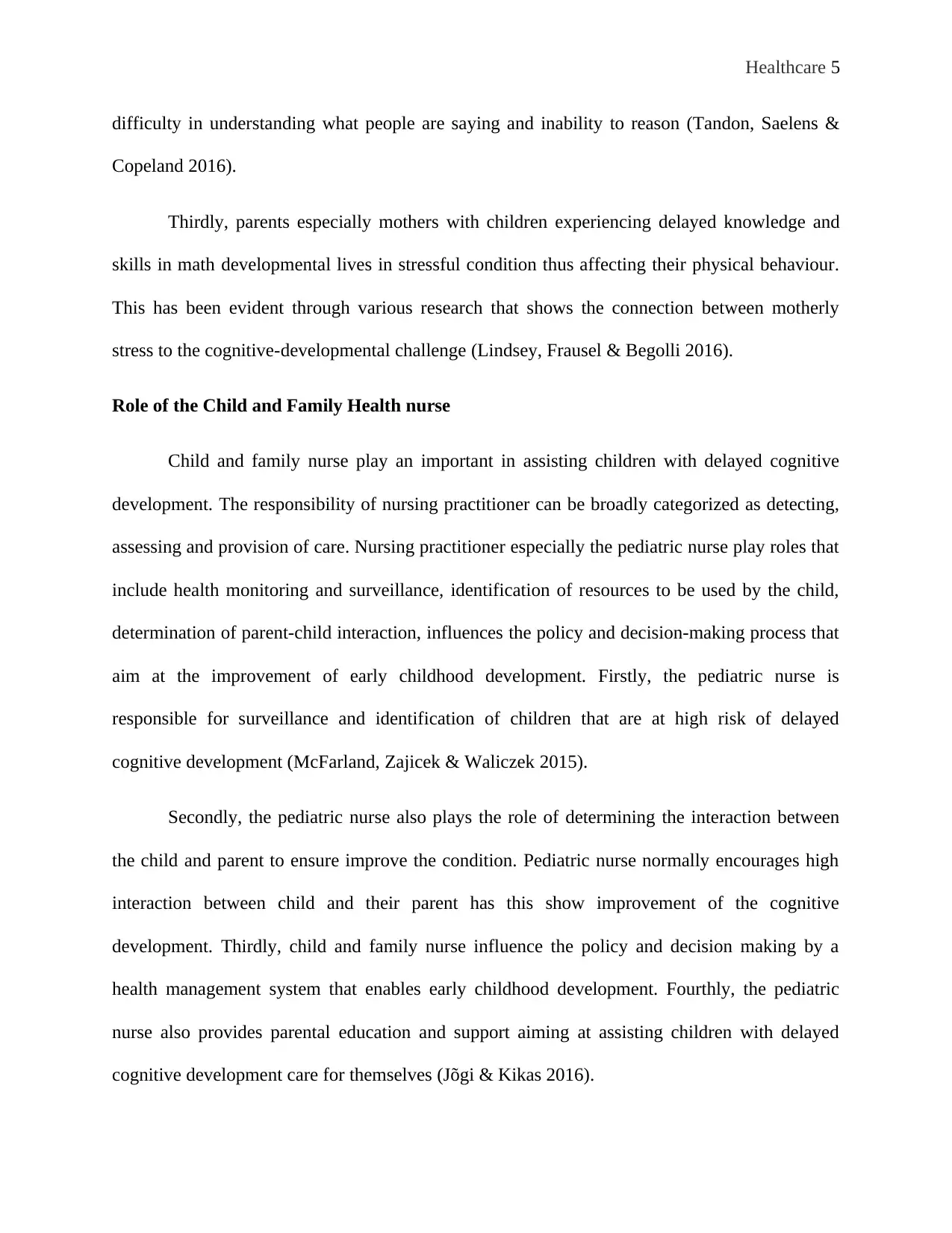
Healthcare 5
difficulty in understanding what people are saying and inability to reason (Tandon, Saelens &
Copeland 2016).
Thirdly, parents especially mothers with children experiencing delayed knowledge and
skills in math developmental lives in stressful condition thus affecting their physical behaviour.
This has been evident through various research that shows the connection between motherly
stress to the cognitive-developmental challenge (Lindsey, Frausel & Begolli 2016).
Role of the Child and Family Health nurse
Child and family nurse play an important in assisting children with delayed cognitive
development. The responsibility of nursing practitioner can be broadly categorized as detecting,
assessing and provision of care. Nursing practitioner especially the pediatric nurse play roles that
include health monitoring and surveillance, identification of resources to be used by the child,
determination of parent-child interaction, influences the policy and decision-making process that
aim at the improvement of early childhood development. Firstly, the pediatric nurse is
responsible for surveillance and identification of children that are at high risk of delayed
cognitive development (McFarland, Zajicek & Waliczek 2015).
Secondly, the pediatric nurse also plays the role of determining the interaction between
the child and parent to ensure improve the condition. Pediatric nurse normally encourages high
interaction between child and their parent has this show improvement of the cognitive
development. Thirdly, child and family nurse influence the policy and decision making by a
health management system that enables early childhood development. Fourthly, the pediatric
nurse also provides parental education and support aiming at assisting children with delayed
cognitive development care for themselves (Jõgi & Kikas 2016).
difficulty in understanding what people are saying and inability to reason (Tandon, Saelens &
Copeland 2016).
Thirdly, parents especially mothers with children experiencing delayed knowledge and
skills in math developmental lives in stressful condition thus affecting their physical behaviour.
This has been evident through various research that shows the connection between motherly
stress to the cognitive-developmental challenge (Lindsey, Frausel & Begolli 2016).
Role of the Child and Family Health nurse
Child and family nurse play an important in assisting children with delayed cognitive
development. The responsibility of nursing practitioner can be broadly categorized as detecting,
assessing and provision of care. Nursing practitioner especially the pediatric nurse play roles that
include health monitoring and surveillance, identification of resources to be used by the child,
determination of parent-child interaction, influences the policy and decision-making process that
aim at the improvement of early childhood development. Firstly, the pediatric nurse is
responsible for surveillance and identification of children that are at high risk of delayed
cognitive development (McFarland, Zajicek & Waliczek 2015).
Secondly, the pediatric nurse also plays the role of determining the interaction between
the child and parent to ensure improve the condition. Pediatric nurse normally encourages high
interaction between child and their parent has this show improvement of the cognitive
development. Thirdly, child and family nurse influence the policy and decision making by a
health management system that enables early childhood development. Fourthly, the pediatric
nurse also provides parental education and support aiming at assisting children with delayed
cognitive development care for themselves (Jõgi & Kikas 2016).
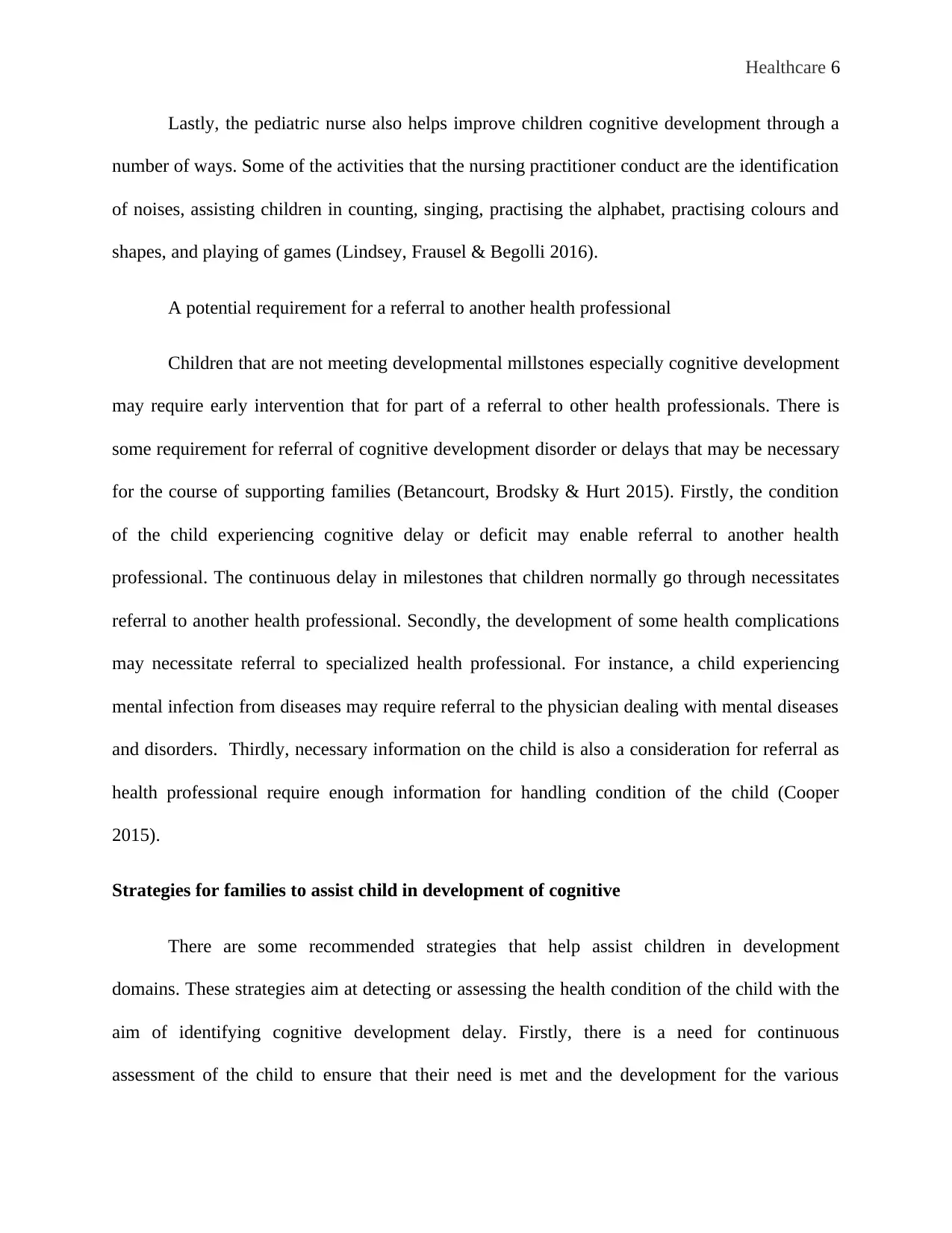
Healthcare 6
Lastly, the pediatric nurse also helps improve children cognitive development through a
number of ways. Some of the activities that the nursing practitioner conduct are the identification
of noises, assisting children in counting, singing, practising the alphabet, practising colours and
shapes, and playing of games (Lindsey, Frausel & Begolli 2016).
A potential requirement for a referral to another health professional
Children that are not meeting developmental millstones especially cognitive development
may require early intervention that for part of a referral to other health professionals. There is
some requirement for referral of cognitive development disorder or delays that may be necessary
for the course of supporting families (Betancourt, Brodsky & Hurt 2015). Firstly, the condition
of the child experiencing cognitive delay or deficit may enable referral to another health
professional. The continuous delay in milestones that children normally go through necessitates
referral to another health professional. Secondly, the development of some health complications
may necessitate referral to specialized health professional. For instance, a child experiencing
mental infection from diseases may require referral to the physician dealing with mental diseases
and disorders. Thirdly, necessary information on the child is also a consideration for referral as
health professional require enough information for handling condition of the child (Cooper
2015).
Strategies for families to assist child in development of cognitive
There are some recommended strategies that help assist children in development
domains. These strategies aim at detecting or assessing the health condition of the child with the
aim of identifying cognitive development delay. Firstly, there is a need for continuous
assessment of the child to ensure that their need is met and the development for the various
Lastly, the pediatric nurse also helps improve children cognitive development through a
number of ways. Some of the activities that the nursing practitioner conduct are the identification
of noises, assisting children in counting, singing, practising the alphabet, practising colours and
shapes, and playing of games (Lindsey, Frausel & Begolli 2016).
A potential requirement for a referral to another health professional
Children that are not meeting developmental millstones especially cognitive development
may require early intervention that for part of a referral to other health professionals. There is
some requirement for referral of cognitive development disorder or delays that may be necessary
for the course of supporting families (Betancourt, Brodsky & Hurt 2015). Firstly, the condition
of the child experiencing cognitive delay or deficit may enable referral to another health
professional. The continuous delay in milestones that children normally go through necessitates
referral to another health professional. Secondly, the development of some health complications
may necessitate referral to specialized health professional. For instance, a child experiencing
mental infection from diseases may require referral to the physician dealing with mental diseases
and disorders. Thirdly, necessary information on the child is also a consideration for referral as
health professional require enough information for handling condition of the child (Cooper
2015).
Strategies for families to assist child in development of cognitive
There are some recommended strategies that help assist children in development
domains. These strategies aim at detecting or assessing the health condition of the child with the
aim of identifying cognitive development delay. Firstly, there is a need for continuous
assessment of the child to ensure that their need is met and the development for the various
⊘ This is a preview!⊘
Do you want full access?
Subscribe today to unlock all pages.

Trusted by 1+ million students worldwide
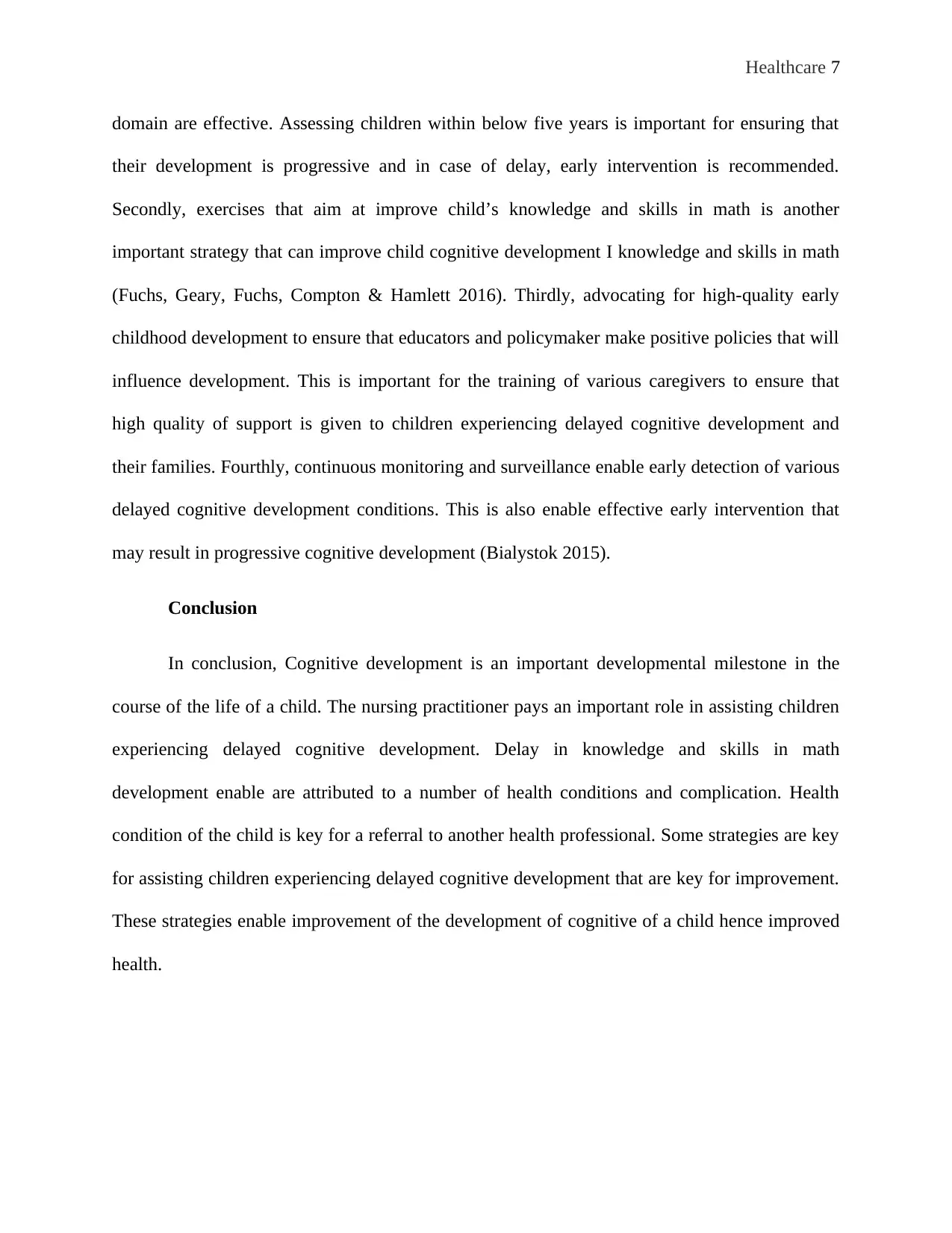
Healthcare 7
domain are effective. Assessing children within below five years is important for ensuring that
their development is progressive and in case of delay, early intervention is recommended.
Secondly, exercises that aim at improve child’s knowledge and skills in math is another
important strategy that can improve child cognitive development I knowledge and skills in math
(Fuchs, Geary, Fuchs, Compton & Hamlett 2016). Thirdly, advocating for high-quality early
childhood development to ensure that educators and policymaker make positive policies that will
influence development. This is important for the training of various caregivers to ensure that
high quality of support is given to children experiencing delayed cognitive development and
their families. Fourthly, continuous monitoring and surveillance enable early detection of various
delayed cognitive development conditions. This is also enable effective early intervention that
may result in progressive cognitive development (Bialystok 2015).
Conclusion
In conclusion, Cognitive development is an important developmental milestone in the
course of the life of a child. The nursing practitioner pays an important role in assisting children
experiencing delayed cognitive development. Delay in knowledge and skills in math
development enable are attributed to a number of health conditions and complication. Health
condition of the child is key for a referral to another health professional. Some strategies are key
for assisting children experiencing delayed cognitive development that are key for improvement.
These strategies enable improvement of the development of cognitive of a child hence improved
health.
domain are effective. Assessing children within below five years is important for ensuring that
their development is progressive and in case of delay, early intervention is recommended.
Secondly, exercises that aim at improve child’s knowledge and skills in math is another
important strategy that can improve child cognitive development I knowledge and skills in math
(Fuchs, Geary, Fuchs, Compton & Hamlett 2016). Thirdly, advocating for high-quality early
childhood development to ensure that educators and policymaker make positive policies that will
influence development. This is important for the training of various caregivers to ensure that
high quality of support is given to children experiencing delayed cognitive development and
their families. Fourthly, continuous monitoring and surveillance enable early detection of various
delayed cognitive development conditions. This is also enable effective early intervention that
may result in progressive cognitive development (Bialystok 2015).
Conclusion
In conclusion, Cognitive development is an important developmental milestone in the
course of the life of a child. The nursing practitioner pays an important role in assisting children
experiencing delayed cognitive development. Delay in knowledge and skills in math
development enable are attributed to a number of health conditions and complication. Health
condition of the child is key for a referral to another health professional. Some strategies are key
for assisting children experiencing delayed cognitive development that are key for improvement.
These strategies enable improvement of the development of cognitive of a child hence improved
health.
Paraphrase This Document
Need a fresh take? Get an instant paraphrase of this document with our AI Paraphraser
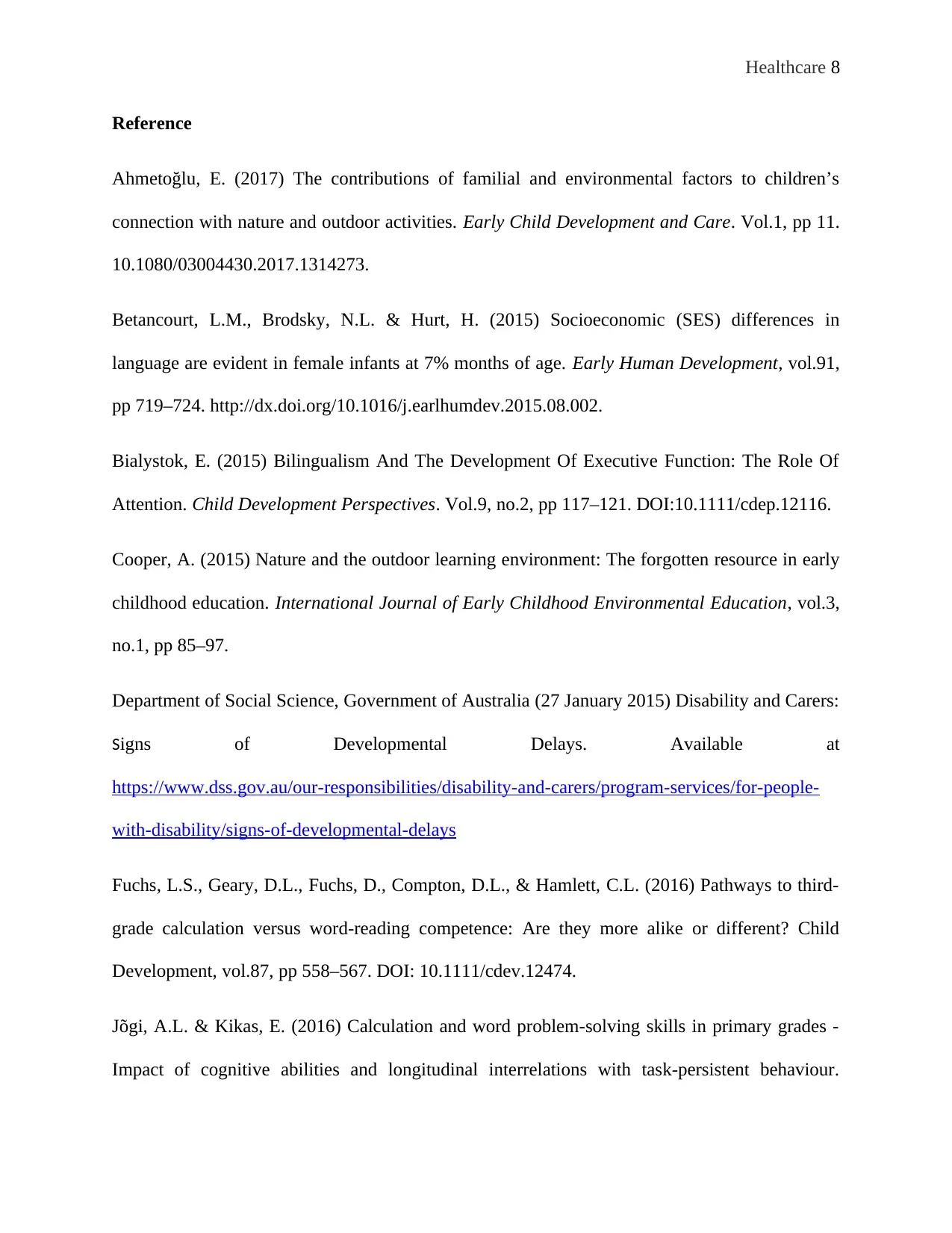
Healthcare 8
Reference
Ahmetoğlu, E. (2017) The contributions of familial and environmental factors to children’s
connection with nature and outdoor activities. Early Child Development and Care. Vol.1, pp 11.
10.1080/03004430.2017.1314273.
Betancourt, L.M., Brodsky, N.L. & Hurt, H. (2015) Socioeconomic (SES) differences in
language are evident in female infants at 7% months of age. Early Human Development, vol.91,
pp 719–724. http://dx.doi.org/10.1016/j.earlhumdev.2015.08.002.
Bialystok, E. (2015) Bilingualism And The Development Of Executive Function: The Role Of
Attention. Child Development Perspectives. Vol.9, no.2, pp 117–121. DOI:10.1111/cdep.12116.
Cooper, A. (2015) Nature and the outdoor learning environment: The forgotten resource in early
childhood education. International Journal of Early Childhood Environmental Education, vol.3,
no.1, pp 85–97.
Department of Social Science, Government of Australia (27 January 2015) Disability and Carers:
Signs of Developmental Delays. Available at
https://www.dss.gov.au/our-responsibilities/disability-and-carers/program-services/for-people-
with-disability/signs-of-developmental-delays
Fuchs, L.S., Geary, D.L., Fuchs, D., Compton, D.L., & Hamlett, C.L. (2016) Pathways to third-
grade calculation versus word-reading competence: Are they more alike or different? Child
Development, vol.87, pp 558–567. DOI: 10.1111/cdev.12474.
Jõgi, A.L. & Kikas, E. (2016) Calculation and word problem-solving skills in primary grades -
Impact of cognitive abilities and longitudinal interrelations with task-persistent behaviour.
Reference
Ahmetoğlu, E. (2017) The contributions of familial and environmental factors to children’s
connection with nature and outdoor activities. Early Child Development and Care. Vol.1, pp 11.
10.1080/03004430.2017.1314273.
Betancourt, L.M., Brodsky, N.L. & Hurt, H. (2015) Socioeconomic (SES) differences in
language are evident in female infants at 7% months of age. Early Human Development, vol.91,
pp 719–724. http://dx.doi.org/10.1016/j.earlhumdev.2015.08.002.
Bialystok, E. (2015) Bilingualism And The Development Of Executive Function: The Role Of
Attention. Child Development Perspectives. Vol.9, no.2, pp 117–121. DOI:10.1111/cdep.12116.
Cooper, A. (2015) Nature and the outdoor learning environment: The forgotten resource in early
childhood education. International Journal of Early Childhood Environmental Education, vol.3,
no.1, pp 85–97.
Department of Social Science, Government of Australia (27 January 2015) Disability and Carers:
Signs of Developmental Delays. Available at
https://www.dss.gov.au/our-responsibilities/disability-and-carers/program-services/for-people-
with-disability/signs-of-developmental-delays
Fuchs, L.S., Geary, D.L., Fuchs, D., Compton, D.L., & Hamlett, C.L. (2016) Pathways to third-
grade calculation versus word-reading competence: Are they more alike or different? Child
Development, vol.87, pp 558–567. DOI: 10.1111/cdev.12474.
Jõgi, A.L. & Kikas, E. (2016) Calculation and word problem-solving skills in primary grades -
Impact of cognitive abilities and longitudinal interrelations with task-persistent behaviour.
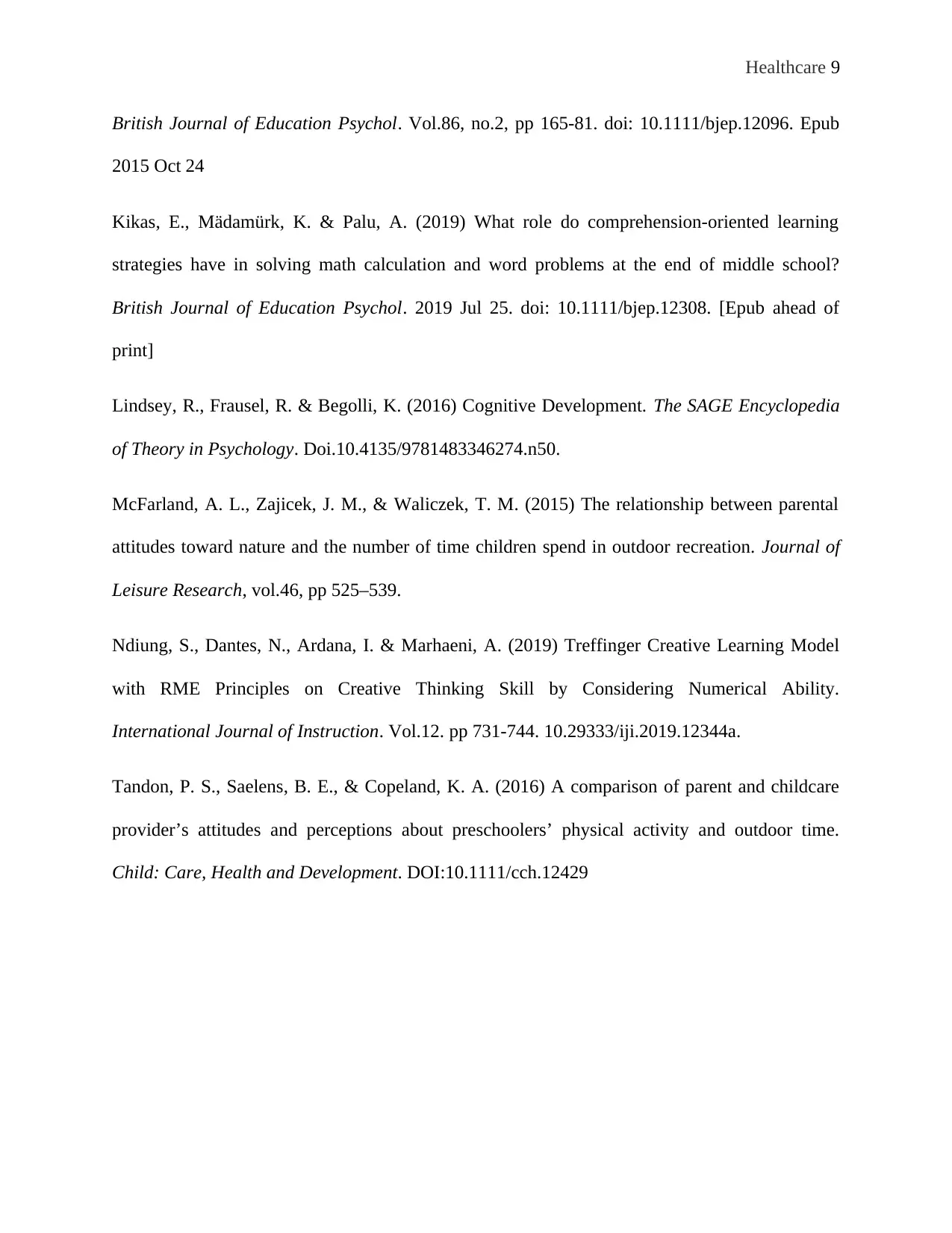
Healthcare 9
British Journal of Education Psychol. Vol.86, no.2, pp 165-81. doi: 10.1111/bjep.12096. Epub
2015 Oct 24
Kikas, E., Mädamürk, K. & Palu, A. (2019) What role do comprehension-oriented learning
strategies have in solving math calculation and word problems at the end of middle school?
British Journal of Education Psychol. 2019 Jul 25. doi: 10.1111/bjep.12308. [Epub ahead of
print]
Lindsey, R., Frausel, R. & Begolli, K. (2016) Cognitive Development. The SAGE Encyclopedia
of Theory in Psychology. Doi.10.4135/9781483346274.n50.
McFarland, A. L., Zajicek, J. M., & Waliczek, T. M. (2015) The relationship between parental
attitudes toward nature and the number of time children spend in outdoor recreation. Journal of
Leisure Research, vol.46, pp 525–539.
Ndiung, S., Dantes, N., Ardana, I. & Marhaeni, A. (2019) Treffinger Creative Learning Model
with RME Principles on Creative Thinking Skill by Considering Numerical Ability.
International Journal of Instruction. Vol.12. pp 731-744. 10.29333/iji.2019.12344a.
Tandon, P. S., Saelens, B. E., & Copeland, K. A. (2016) A comparison of parent and childcare
provider’s attitudes and perceptions about preschoolers’ physical activity and outdoor time.
Child: Care, Health and Development. DOI:10.1111/cch.12429
British Journal of Education Psychol. Vol.86, no.2, pp 165-81. doi: 10.1111/bjep.12096. Epub
2015 Oct 24
Kikas, E., Mädamürk, K. & Palu, A. (2019) What role do comprehension-oriented learning
strategies have in solving math calculation and word problems at the end of middle school?
British Journal of Education Psychol. 2019 Jul 25. doi: 10.1111/bjep.12308. [Epub ahead of
print]
Lindsey, R., Frausel, R. & Begolli, K. (2016) Cognitive Development. The SAGE Encyclopedia
of Theory in Psychology. Doi.10.4135/9781483346274.n50.
McFarland, A. L., Zajicek, J. M., & Waliczek, T. M. (2015) The relationship between parental
attitudes toward nature and the number of time children spend in outdoor recreation. Journal of
Leisure Research, vol.46, pp 525–539.
Ndiung, S., Dantes, N., Ardana, I. & Marhaeni, A. (2019) Treffinger Creative Learning Model
with RME Principles on Creative Thinking Skill by Considering Numerical Ability.
International Journal of Instruction. Vol.12. pp 731-744. 10.29333/iji.2019.12344a.
Tandon, P. S., Saelens, B. E., & Copeland, K. A. (2016) A comparison of parent and childcare
provider’s attitudes and perceptions about preschoolers’ physical activity and outdoor time.
Child: Care, Health and Development. DOI:10.1111/cch.12429
⊘ This is a preview!⊘
Do you want full access?
Subscribe today to unlock all pages.

Trusted by 1+ million students worldwide
1 out of 9
Related Documents
Your All-in-One AI-Powered Toolkit for Academic Success.
+13062052269
info@desklib.com
Available 24*7 on WhatsApp / Email
![[object Object]](/_next/static/media/star-bottom.7253800d.svg)
Unlock your academic potential
Copyright © 2020–2026 A2Z Services. All Rights Reserved. Developed and managed by ZUCOL.




